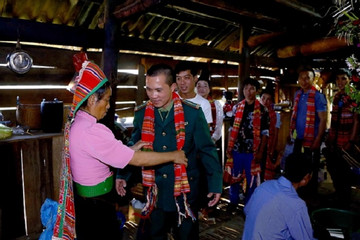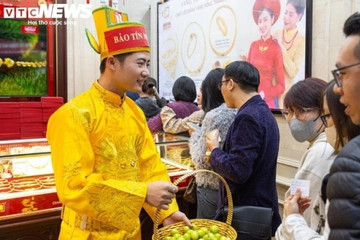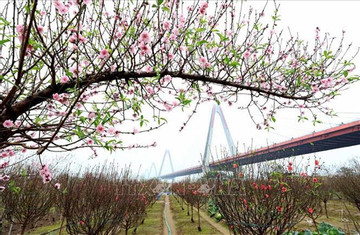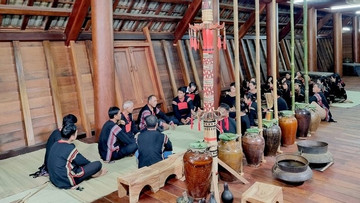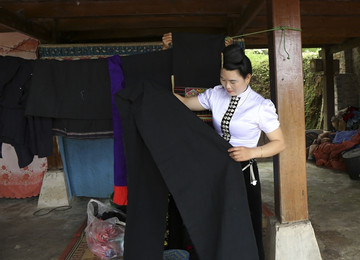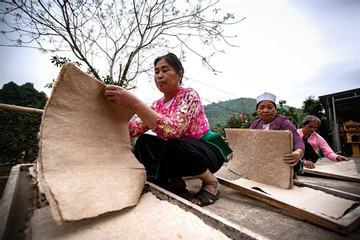- © Copyright of Vietnamnet Global.
- Tel: 024 3772 7988 Fax: (024) 37722734
- Email: evnn@vietnamnet.vn
vietnam culture
Update news vietnam culture
Cham man preserves traditional brocade weaving, welcomes visitors
Mohamad, the owner of a traditional Cham brocade weaving establishment in Chau Phong commune in Tan Chau town in An Giang province, is a third-generation craftsman who has preserved the art of traditional weaving.
Pounding Com Festival, a unique cultural feature of the Tay
When the rice is about to be harvested, the Tay people in Tuyen Quang province hold a festival celebrating pounded com (young sticky rice).
Cultures of VN's ethnic groups exhibited on Google platform
The online museum platform Google Arts and Culture has officially launched an exclusive site for Việt Nam called ’Vibrant Vietnam’ said the Vietnam National Authority of Tourism (VNAT).
Origins and significance of Vu Lan Festival
According to Buddhist beliefs, the 15th day of the 7th lunar month, known as Vu Lan, is associated with the story of Maudgalyayana (Muc Kien Lien in Vietnamese) saving his mother from the realm of hungry ghosts.
Foreign tourists astonished by joss paper burnings on Hanoi’s sidewalks
On the eve of the 7th lunar month's 15th day, Hanoi’s Old Quarter buzzed with families and businesses preparing offerings on the sidewalks, burning joss paper, and scattering rice and salt for good fortune.
The commune where local people wear black blouses, gather hair into a bun
Located at the eastern foot of Nua Mountain in Vung Tau City in Ba Ria – Vung Tau province, Long Son Big House is well known for the images of people with bare feet and hair buns, wearing black ao ba ba (loose-fitting blouses).
Xinh Mun people celebrate traditional festival
Sà Típ Festival begins with the ritual offering, which is then followed by the activities of drinking rice wine, enjoying the feast and dancing to the rhythms of the drums and gongs.
When foreign leaders ride bikes on streets, eat banh my and drink coffee
In 2023, many foreign politicians were invited by Vietnamese leaders to experience activities that symbolize their strong relationships.
Gold shops prepare for God of Wealth Day rush
Jewelry shops and companies have prepared large numbers of lucky gold products to meet consumers’ surging demand on the God of Wealth Day on the 10th day of the new lunar year, which falls on February 19 this year.
Popular ornamental plants in Vietnamese houses during Tet
As a common habit, Vietnamese people often decorate their houses with peach blossoms, apricot blossoms, and kumquat trees during the Lunar New Year (Tet) Festival in the hopes for luck, wealth, and happiness to their family.
Unique wedding procedures of the Ede
The Ede people are matriarchal so weddings are normally initiated by women.
Documentary heritage protection: passing the torch to the youth
While learning about and practicing heritage, young people will find appropriate ways to face their heritage, as well as promote the value of heritage for future generations. This is like a torch being passed from one person’s hand to another.
The bride-welcoming ceremony of the Giay ethnic people
The Giay ethnic people in the north-western mountainous province of Lai Chau consider the wedding, including the bride-welcoming ceremony, to be the happiest event in the couple’s life.
Traditional market revives Dong Ho folk paintings
The Department of Culture, Sports, and Tourism of Bắc Ninh has restored the folk painting market at Song Hồ Ward’s Centre for the Preservation of Folk Paintings.
Agencies question $14.2b package for national cultural development programme
It is estimated by the ministry that by 2030, about VNĐ182 trillion will be needed to invest in the programme, including 110 trillion from the State budget, VNĐ36 trillion from local budget and VNĐ36 trillion from others.
Honoring Holy Mother in Hue
Deep within the heart of the central city of Hue lies Hue Nam, also known as Hon Chen Temple.
Thai group keeps traditional cloth dyeing alive
The Thai is the third-largest in the country, with around 1.5 million people, ranking only after the Kinh and Tày groups.
Enjoying Saigon’s sidewalk coffee stands at night
Sitting on a sidewalk to sip a cup of coffee at night is an interesting experience for many tourists in HCM City.
Muong ethnic artisans preserve craft on the verge of being forgotten
Dating back many centuries, the craft of making dó (poonah) paper of the Mường ethnic people living in Suối Cỏ Hamlet in Cao Sơn Commune, Lương Sơn District in Hòa Bình Province has been passed down for many generations among the group.
Young Mong stylist reconstructs ethnic costume
To highlight the beauty and authenticity of Mong culture, Chau Thi Nung and her collaborators have launched a fashion project that recreates the costumes worn by distinct Mong throughout VN.






